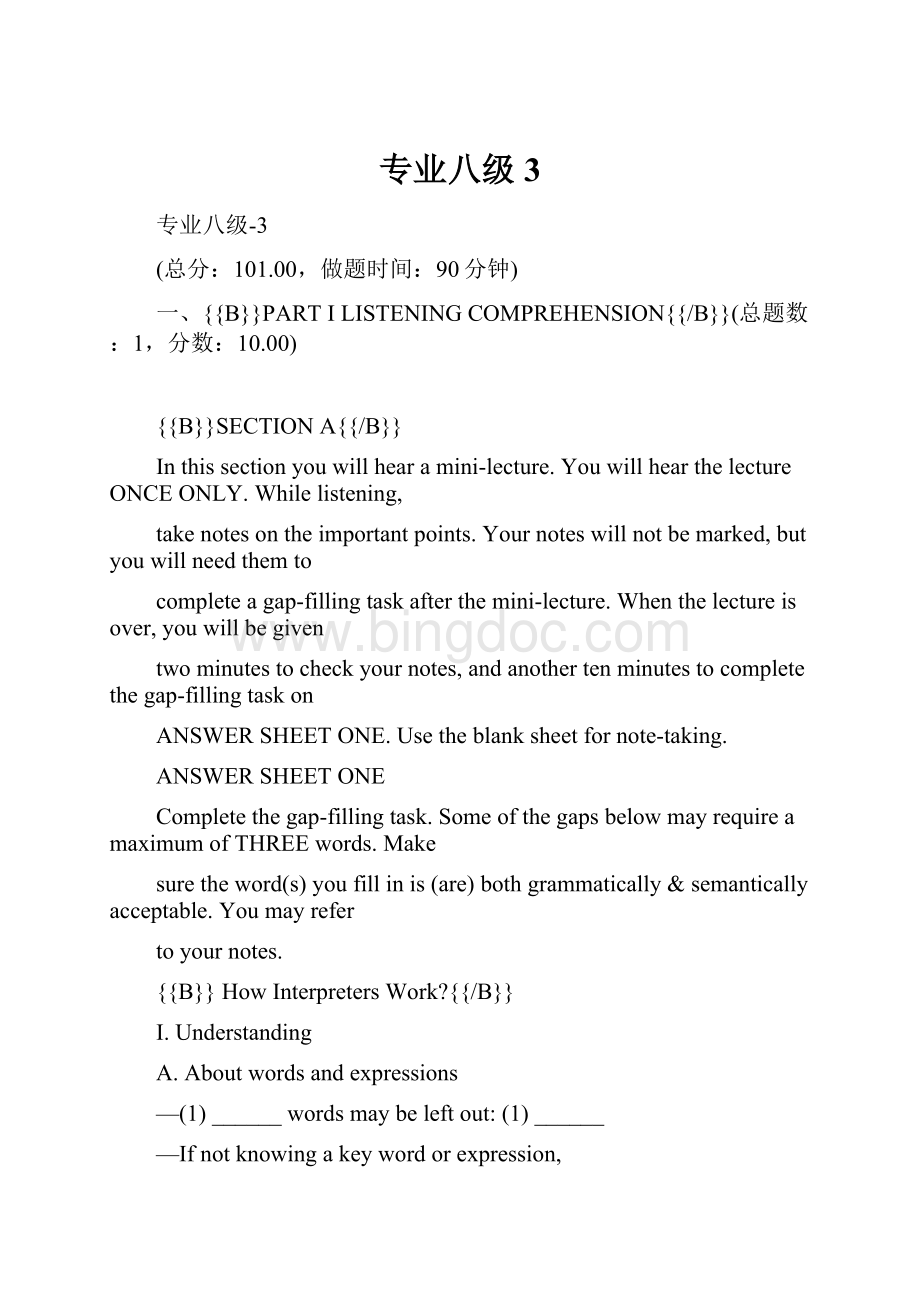专业八级 3Word下载.docx
《专业八级 3Word下载.docx》由会员分享,可在线阅读,更多相关《专业八级 3Word下载.docx(65页珍藏版)》请在冰点文库上搜索。

ANSWERSHEETONE.Usetheblanksheetfornote-taking.
ANSWERSHEETONE
Completethegap-fillingtask.SomeofthegapsbelowmayrequireamaximumofTHREEwords.Make
suretheword(s)youfillinis(are)bothgrammatically&
semanticallyacceptable.Youmayrefer
toyournotes.
{{B}}HowInterpretersWork?
{{/B}}
Ⅰ.Understanding
A.Aboutwordsandexpressions
—
(1)______wordsmaybeleftout:
(1)______
—Ifnotknowingakeywordorexpression,
a)admitorclarifythequestionifnecessary,withthedelegates.
b)deducefrom
(2)______
(2)______
B.Aboutideas/concepts
—(3)______ofdifferentkindsoftextsthat(3)______
a)presentlogicalarguments
b)presentasequenceof(4)______(4)______
c)aredescriptive,focusingonanevent,asceneorasituation
—identificationofthemainideas
—analysisofideaslinkedby(5)______(5)______
Ⅱ.Memorizationofaspeech
A.Objective
—tocreateatelegraphicversionofthediscourse
—tolinkitsdifferentpartsthroughitssemantic-logicalconnections
B.Meansofmemorization
—concentratingontheideas
—connectingmainideastoaseriesof(6)______(6)______
—focusingonthelinksamongthemainideas
Ⅲ.(7)______ofthecontentinanotherlanguage(7)______
A.Goal:
makesuretheaudienceunderstandthespeech.
B.Suggestions:
—enrichingone'
sgeneralvocabularyandstyle
—followingthepressinone'
snativelanguage
—watchingTV,seemovies,etc.inthe(8)______language(8)______
Ⅳ.Conclusion
A.Interpretingisaprofessionthatisallaboutcommunication:
—maketheirownspeech(9)______thespeechestheyinterpret(9)______
befaithfultotheoriginalspeech
—.
—asaccurateaspossible
B.Interpretersshouldtakeadvantageof
allthepossible(10)______availableintheirworkinglanguages.(10)______
—befaithfultotheoriginalspeech
(分数:
(1).
1.00)
填空项1:
__________________(正确答案:
Unimportant/Lessimportant)
解析:
[听力原文]1-10{{B}}HowInterpretersWork{{/B}}Goodmorning.TodayI'
dliketogiveyou
abriefintroductiontoaninterpreter'
swork.Generallyspeaking,aninterpreterhastofulfill
threestagesduringhiswork:
theunderstandingofthespeaker'
soriginalmessage,the
memorizationofaspeechandthere-expressionofthesamecontentinanotherlanguage,withthe
helpofsomenotestheinterpreterwritesdownuponhearingtheoriginalmessage.Thefirststage
istheunderstanding.Theunderstandingwerefertohereisnotofwordsbutofideas,sincean
interpreterhastoconveyconcepts.Butwhathappensifaninterpreterdoesn'
tknowonewordor
anexpressionthatheorshehearsinaspeech?
Firstofallwecanunderlinethataninterpreter
canunderstandaspeaker'
smeaningwithoutactuallyunderstandingeverysinglewordandexpression
used.Thereareotheroccasions,however,where[1]awordistooimportanttobeleftout.ff
theinterpreterdoesnotknowakeyword,therecanbeproblems.Butafterhearingthewholespeech,
heorsheshouldbeabletodeducethemeaningofitfromthecontext,giventhenumbersofclues
theyhave.Moreover,interpreterscannotbeexpectedtobeencyclopaedicdictionaries,andthey
mustacceptthattherearetimeswhentheydonotknowawordoranidiomaticexpression.Ina
situationofdirectcontactwiththedelegates,theinterpretermustadmithisorherignorance
and,ifnecessary,clarifythequestionwiththedelegates.Ontheotherhand,theinterpreter
doesnothavetherighttoguessatmeaningsinordertohideanormallypossible,evenif
embarrassing,situation.Furthermore,inordertounderstandmeaningwithoutknowingallthe
lexicalitems,[2]andtobeabletodeducefromcontext,interpretersmustinanycasehavea
thoroughknowledgeoftheirworkinglanguages.[3]inordertounderstandtheideasofaspeech,
aninterpreterneedstogetfamiliarwithdifferentkindsoftexts.Theycanpresentlogical
argumentsshowingbothpointsofviewonaquestionbeforearrivingatasyntheticconclusion,
[4]theycanbeasequenceoflogicaldeductionsleadingtoanobviousconclusionaccordingto
thespeaker'
spointofview,andtheymaysimplybedescriptive,focusingonanevent,ascene
orasituation.Whatfollowsistheidentificationofthemainideas.Inordertounderstanda
message,aninterpreterhastoidentifythemainideasandgivethemtheirproperrelevancein
theinterpretation.And,owingtotheintrinsicdifficultyofaspeechortothespeaker'
sspeed,
heorshemightbeforcedtoomitoneormoreelementsoftheoriginal.Itisclearthatifthe
interpreterdoesn'
ttranslatesomedetails,theinterpretationwillnotbeperfectbutstill
adequate,whereas,ifheorshemissesoutsignificantpointsofthediscourse,theresultwill
beaseriouslyflawedperformance.Indeed,interpretersshouldbecapableofprovidingasummary
ofaspeech,sincedelegatesoftendon'
twantadetailedinterpretationbutonlyanexhaustive
andprecisesummaryofwhathasbeensaid.What'
sgoingonnextinunderstandingphaseisthe
analysisoflinksofthemainideas.Aspeechisnotonlyasequenceofideas,butalsoaseries
ofideasrelatedtooneanotherinaparticularway.[5]Ideasmaybelinkedbylogicalconsequences,
logicalcauses,puttogetherwithoutcause-effectrelations,andmayalsobeexpressedbyaseries
ofopposingconcepts.Thesecondstageofinterpretingisthememorizationofaspeech.The
objectiveistocreateatelegraphicversionofthediscourse,andtolinkitsdifferentparts
throughitssemantic-logicalconnections.Wehavedifferentmeanstorememberaspeech.One
possibilityisthatofinternallyvisualizingthecontentofaspeechandcreatingimagesinone'
s
mind.Specificallyspeaking,aninterpreterneedstoconcentrateonideas,notonsinglewords,
[6]connectthemainideastoaseriesofnumbers,andthenconcentrateonthelinksamongthe
mainideassoastoreproducethestructureofthespeechasakindofskeleton.[7]Thethird
stageofinterpretingisre-expression.Afterunderstanding,analyzingandmemorizing,
interpretershavetore-expressthespeechtheyhavejustheard.Itmustbeclearthattheyare
notrequiredtogiveanacademicallyperfecttranslation.Theirroleistomakesurethespeaker
isunderstoodbytheaudiencesorealinterpretershavetocontinuetoworkontheirworking
languages,includingtheirmothertongue,withtheaimofkeepingthemrich,lively,effective
andup-to-date.Therefore,theymustbeinformedaboutthelatestnationalorinternationalevents
withthepurposeoflearningnewterminologyandalsoofgrabbingthespiritoftheerawe'
re
livingin.Tothisend,itispossibletosuggestthefollowingadvice:
First,constantlyenrich
one'
sgeneralvocabularyandstyle,throughregularreadingofabroadrangeofwell-written
publicationsinallworkinglanguages;
Second,followthepressinone'
snativelanguagetoo,
whichisofparticularimportancefori